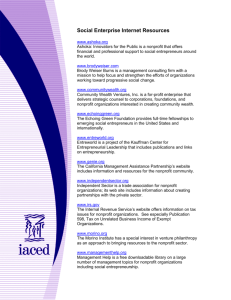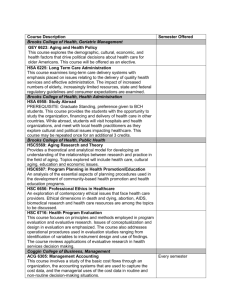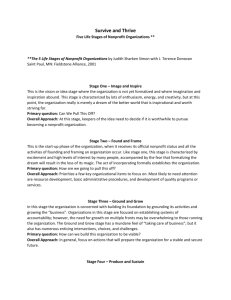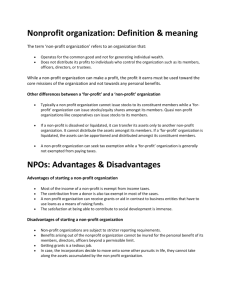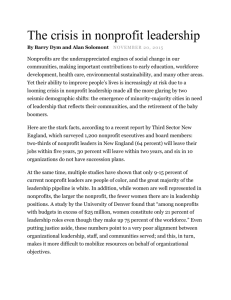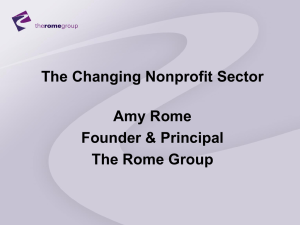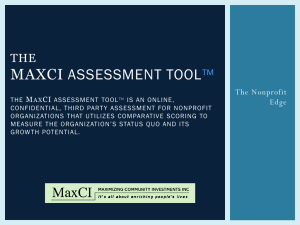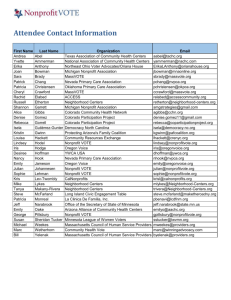Social Enterprise 101 - The Canadian CED Network
advertisement
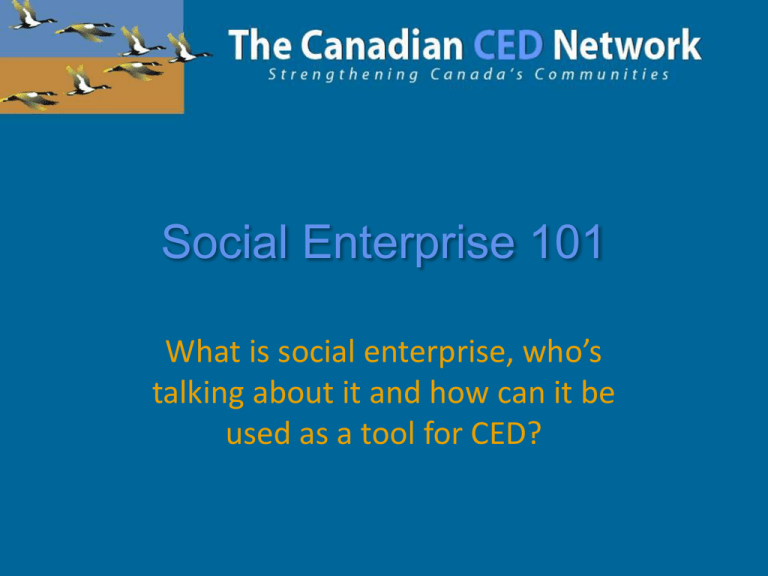
Social Enterprise 101 What is social enterprise, who’s talking about it and how can it be used as a tool for CED? Definitions • “Social enterprises are businesses owned by nonprofit organizations, that are directly involved in the production and/or selling of goods and services for the blended purpose of generating income and achieving social, cultural, and/or environmental aims. Social enterprises are one more tool for non-profits to use to meet their mission to contribute to healthy communities.” Social Enterprise Council of Canada • “Social enterprises are businesses whose primary purpose is the common good. They use the methods and disciplines of business and the power of the marketplace to advance their social, environmental and human justice agendas.” -Social Enterprise Alliance, USA • “A social enterprise is a business that trades for a social and/or environmental purpose. It will have a clear sense of its ‘social mission’: which means it will know what difference it is trying to make, who it aims to help, and how it plans to do it. It will bring in most or all of its income through selling goods or services. And it will also have clear rules about what it does with its profits, reinvesting these to further the ‘social mission.’” -Social Enterprise, UK • “A social enterprise is an organization that applies commercial strategies to maximize improvements in human and environmental well-being, rather than maximizing profits for external shareholders. Social enterprises can be structured as a for-profit or non-profit, and may take the form of a co-operative, mutual organization, a social business, or a charity organization.” - Wikipedia A nonprofit operating a business/a business operating like a nonprofit Carries the dual purpose of • generating income from sales and • achieving social, cultural or environmental aims Multiple Bottom Lines Profit People Planet Business Orientation in a Nonprofit World Nonprofit Approach For-Profit Approach • Primary goal is to fulfill social mission • Culture of slow decision- making with multiple layers, including board • Expected to apply bulk of financial resources to direct services to mission • Must achieve social and financials goals concurrently • Focus on what clients and funders want • Primary goal is to make a profit • Need for quick decisionmaking • Expected to invest in infrastructure such as technology & business management • Must achieve financial goals • Focus on what customers and investors want Business Model Continuum Not-for-Profit Ownership For Profit / Private Ownership (including NFP Co-operatives) (including FP Co-operatives) Donations Fee for Services Social Enterprise For-Profit Social Enterprise Blended Return on Investment Corporate Social Responsibility Strictly Seeks Profit Social Economy John Pearce, Social Enterprise in Anytown (2003, Calouste Gulbenkian Foundation) Why Start a Social Enterprise? • To meet a need in the community or the local market not met through traditional business models • Advance or achieve a specific social mission • Contribute to the financial sustainability of a non-profit organization Reasons for Interest in Social Enterprise • Dissatisfaction with the old ways of doing things • Opportunity to creatively address mission • Shifting and unpredictable funding context – need for unrestricted revenue • Gradual increase of business-based thinking in the social development sector • Increasing interest of entrepreneurs in social returns and impact “Social entrepreneurs identify resources where people only see problems….They begin with the assumption of competence and unleash resources in the communities they serve.” David Bornstein, How to Change the World: Social Entrepreneurs and the Power of New Ideas In-House Social Enterprise • Cost centre within an organization • Single purpose SE: SE is the organization Separate Identity • For-profit Subsidiary (wholly or partially controlled) or Separate Nonprofit • Joint Venture/Partnership or Co-operative Pillars of Support for Social Enterprise • Provide support for all stages of development from concept, feasibility, business planning, business launch and growth • Build the Business Skills in the Nonprofit Sector • Access to Appropriate Investment and Financing • Provide Market Opportunities • Research & Demonstrate Value Financing Social Enterprise Types of Capital • Donations • Grants • Sponsorships • Equity/Shares • Community Bonds • Debt Financing • Patient Capital • SALES! Sources • Government programs • Foundations / United Way • Corporations • Credit Unions/Banks • Community Futures • Philanthropists • Investors Challenges • • • • • • • • Procurement policies favour larger businesses Balancing low cost services with sustainable living wages Access to business financing Nonprofit program vs. independent business Nonprofit boards concerned about business risk Nonprofit organizations not understanding social enterprise Some traditional funders still don’t recognize social enterprise Competitive nature of business has potential to damage community and partner relations and the ability to learn from other social enterprises • From a product perspective, it can create anything from planter boxes, fertilizer or patio furniture to packing cartons, meat pies, and cookies. • From a service standpoint, a social enterprise can deliver anything from consulting services, recycling, or building management to courier and voice mailbox services, lawn maintenance, cafes and restaurants. • From a fiscal perspective, non-profit enterprises can generate anywhere from 5% to 100% of a program's or organization's costs. Income sources can range from high-end businesses with private clientele or discounted services paid for by low-income clientele, to government contracts or government-funded services. • From an outcomes perspective, non-profit enterprises can provide preemployment services for Aboriginal youth, supply food or dental services for low-income children, improve watershed management and increase fish stocks, or support the employment of mental health consumers or people with developmental disabilities. Danica Straith Amanda Fisher Tania Lerat Who’s Talking About Social Enterprise • • • • • • • Nonprofit organizations Various levels of government Academics, researchers, students Funders, venture capitalists Networks and associations Independent entrepreneurs Small and large business Some of the Big Champions • • • • • • • • • • • Social Enterprise Council of Canada (www.secouncil.ca) Enterprising Non-Profits (www.enterprisingnonprofits.ca) Canadian Centre for Community Renewal (www.communityrenewal.ca) BC Centre for Social Enterprise (www.centreforsocialenterprise.com) Canadian Social Entrepreneurship Foundation (http://www.csef.ca) ClearlySo Canada (www.clearlyso.ca) Social Innovation Generation @ MaRS (www.marsdd.com/aboutmars/partners/sig) TransFair Canada (http://fairtrade.ca/en/about-fairtrade/what-fair-trade) Canadian Co-operative Association (www.coopscanada.coop) Le Chantier de l’économie sociale (http://www.chantier.qc.ca) Conseil canadien de la coopération et de la mutualité (www.cccm.coop) Recent Research on Social Enterprise • BC-Alberta: www.mtroyal.ca/wcm/groups/public/documents/pdf/socialenterprise2.pd f • Manitoba: www.mtroyal.ca/wcm/groups/public/documents/pdf/insmbsurvey.pdf • New Brunswick: www.sess.ca/english/wp-content/uploads/2013/02/NBSE-Survey-Report1.pdf • Nova Scotia: http://www.sess.ca/english/wpcontent/uploads/2012/12/NS-SocialEnterpriseResearch-ATGK.pdf Education in Social Enterprise • The Université de Sherbrooke - Master's Program in co-op and collective enterprise • Université du Québec à Montréal – MBA Program in social enterprise • Université du Québec à Rimouski - one course on alternative businesses • Concordia University - Graduate Diploma in CED • York University - Schulich School of Business • University of Alberta - Canadian Centre for Social Entrepreneurship • Simon Fraser University - Centre for Sustainable Community Development • Cape Breton University - MBA in Community Economic Development • University of Winnipeg - Department of Business Administration (courses include: Management of Co-operatives, Social Enterprise Management, and Non Profit Management) Professional Development Topics You’d Like to See Covered on Future Calls Thank You!

